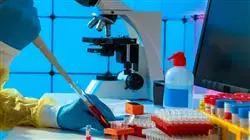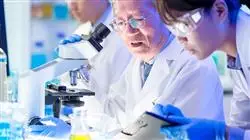University certificate
The world's largest faculty of pharmacy”
Introduction to the Program
Thanks to this Professional master’s degree, you will update on antibiotic therapy by becoming familiar with the most important advances in antibiotic resistance, and you will be able to immediately apply this knowledge to daily practice”

Antimicrobial resistance has become one of the greatest threats to public health today. Faced with this reality, efforts are focused on finding an answer to the cause and on developing new antibiotics while reducing costs.
Precisely because of this new reality where treatment against increasingly resistant bacteria is of particular concern, laboratories are under greater pressure to combat this danger, which requires pharmacists to continuously update their knowledge in the area, to keep abreast of both progress and the latest recommendations in the use of antituberculosis or respiratory quinolones. For this reason, TECH has created an academic program that brings together a specialized and multidisciplinary teaching team, which will provide professionals with the latest information available on the matter.
Pharmacists are, therefore, presented with a program that will teach them the progress and latest developments in microbiology, antibiotics, antiparasitics or the development of antibiotic resistance in only four months’ time. For this purpose, the syllabus takes a theoretical-practical approach and includes multimedia resources and the latest technology applied to academic teaching.
TECH offers a quality academic program, where professionals will be able to update their knowledge in Advances in Antibiotic Therapy and Antibiotic Resistance. Students can conveniently take it from a computer or tablet with an Internet connection, as they will find the program syllabus on the virtual campus. Thus, without face-to-face classes or fixed schedules, professionals can distribute the course load as they wish, while balancing their other responsibilities with an educational experience adapted to the times.
TECH provides you with innovative didactic tools for you to learn more about the latest news in pest control”
This Professional master’s degree in Advances in Antibiotic Therapy and Antibiotic Resistance contains the most complete and up-to-date educational program on the market. Its most notable features are:
- The development of case studies presented by experts focused on advances in antibiotic therapy and antibiotic resistance
- The graphic, schematic, and practical contents with which they are created, provide scientific and practical information on the disciplines that are essential for professional practice
- Practical exercises where self-assessment can be used to improve learning
- Its special emphasis on innovative methodologies in Pediatric Orthopedics
- Theoretical lessons, questions to the expert, debate forums on controversial topics, and individual reflection assignments
- Content that is accessible from any fixed or portable device with an Internet connection
Delve into new therapeutic modalities to control morbidity and mortality due to infectious diseases”
The program’s teaching staff includes professionals from the sector who contribute their work experience to this program, as well as renowned specialists from leading societies and prestigious universities.
The multimedia content, developed with the latest educational technology, will provide the professional with situated and contextual learning, i.e., a simulated environment that will provide immersive specialization programmed to learn in real situations.
This program is designed around Problem-Based Learning, whereby the professional must try to solve the different professional practice situations that arise throughout the program. For this purpose, the student will be assisted by an innovative interactive video system created by renowned and experienced experts.
This 100% online program gives you the opportunity to update your knowledge of antibiotic resistance without neglecting your professional responsibilities"

It will take you through the most recent changes in the management of herpes antivirals"
Why study at TECH?
TECH is the world’s largest online university. With an impressive catalog of more than 14,000 university programs available in 11 languages, it is positioned as a leader in employability, with a 99% job placement rate. In addition, it relies on an enormous faculty of more than 6,000 professors of the highest international renown.

Study at the world's largest online university and guarantee your professional success. The future starts at TECH”
The world’s best online university according to FORBES
The prestigious Forbes magazine, specialized in business and finance, has highlighted TECH as “the world's best online university” This is what they have recently stated in an article in their digital edition in which they echo the success story of this institution, “thanks to the academic offer it provides, the selection of its teaching staff, and an innovative learning method aimed at educating the professionals of the future”
A revolutionary study method, a cutting-edge faculty and a practical focus: the key to TECH's success.
The most complete study plans on the university scene
TECH offers the most complete study plans on the university scene, with syllabuses that cover fundamental concepts and, at the same time, the main scientific advances in their specific scientific areas. In addition, these programs are continuously being updated to guarantee students the academic vanguard and the most in-demand professional skills. In this way, the university's qualifications provide its graduates with a significant advantage to propel their careers to success.
TECH offers the most comprehensive and intensive study plans on the current university scene.
A world-class teaching staff
TECH's teaching staff is made up of more than 6,000 professors with the highest international recognition. Professors, researchers and top executives of multinational companies, including Isaiah Covington, performance coach of the Boston Celtics; Magda Romanska, principal investigator at Harvard MetaLAB; Ignacio Wistumba, chairman of the department of translational molecular pathology at MD Anderson Cancer Center; and D.W. Pine, creative director of TIME magazine, among others.
Internationally renowned experts, specialized in different branches of Health, Technology, Communication and Business, form part of the TECH faculty.
A unique learning method
TECH is the first university to use Relearning in all its programs. It is the best online learning methodology, accredited with international teaching quality certifications, provided by prestigious educational agencies. In addition, this disruptive educational model is complemented with the “Case Method”, thereby setting up a unique online teaching strategy. Innovative teaching resources are also implemented, including detailed videos, infographics and interactive summaries.
TECH combines Relearning and the Case Method in all its university programs to guarantee excellent theoretical and practical learning, studying whenever and wherever you want.
The world's largest online university
TECH is the world’s largest online university. We are the largest educational institution, with the best and widest online educational catalog, one hundred percent online and covering the vast majority of areas of knowledge. We offer a large selection of our own degrees and accredited online undergraduate and postgraduate degrees. In total, more than 14,000 university degrees, in eleven different languages, make us the largest educational largest in the world.
TECH has the world's most extensive catalog of academic and official programs, available in more than 11 languages.
Google Premier Partner
The American technology giant has awarded TECH the Google Google Premier Partner badge. This award, which is only available to 3% of the world's companies, highlights the efficient, flexible and tailored experience that this university provides to students. The recognition as a Google Premier Partner not only accredits the maximum rigor, performance and investment in TECH's digital infrastructures, but also places this university as one of the world's leading technology companies.
Google has positioned TECH in the top 3% of the world's most important technology companies by awarding it its Google Premier Partner badge.
The official online university of the NBA
TECH is the official online university of the NBA. Thanks to our agreement with the biggest league in basketball, we offer our students exclusive university programs, as well as a wide variety of educational resources focused on the business of the league and other areas of the sports industry. Each program is made up of a uniquely designed syllabus and features exceptional guest hosts: professionals with a distinguished sports background who will offer their expertise on the most relevant topics.
TECH has been selected by the NBA, the world's top basketball league, as its official online university.
The top-rated university by its students
Students have positioned TECH as the world's top-rated university on the main review websites, with a highest rating of 4.9 out of 5, obtained from more than 1,000 reviews. These results consolidate TECH as the benchmark university institution at an international level, reflecting the excellence and positive impact of its educational model.” reflecting the excellence and positive impact of its educational model.”
TECH is the world’s top-rated university by its students.
Leaders in employability
TECH has managed to become the leading university in employability. 99% of its students obtain jobs in the academic field they have studied, within one year of completing any of the university's programs. A similar number achieve immediate career enhancement. All this thanks to a study methodology that bases its effectiveness on the acquisition of practical skills, which are absolutely necessary for professional development.
99% of TECH graduates find a job within a year of completing their studies.
Professional Master's Degree in Advances in Antibiotic Therapy and Antibiotic Resistance
One of the most essential elements for the health sector are antibiotics, since most of the treatments that are performed depend on them. However, recently there has been an excessive use of antibiotics, causing a massive resistance to their effects. This has become one of the greatest threats to public health, which has prompted the scientific community to re-evaluate its processes in order to minimize this problem. Hence, the importance for professionals to update their knowledge in order to learn about new research in the field of antibiotics. The Professional Master's Degree in Advances in Antibiotic Therapy and Antibiotic Resistance of TECH Global University is a unique opportunity to qualify in the area, without having to leave home. Our syllabus was developed by a specialized and multidisciplinary teaching team, in charge of providing you with the most up-to-date topics in the field, including the latest developments in microbiology and its various branches: antiparasitics, antivirals, antimycotics and antimicrobials.
Get a postgraduate program in antibiotic therapy and antibiotic resistance
In 2014, a group of biologists in New York conducted a study, which found that a single bill can harbor up to 3,000 types of bacteria, including a few that may be pathogenic and resistant to antibiotics. It is knowledge in practical areas of biomedicine that enables the population to resist the effects of harmful microorganisms. For this reason, in this TECH Professional Master's Degree we focus on instructing you in the development of drugs capable of inhibiting infections. Over the course of 12 months, you will cover fundamental topics such as the role of biomarkers, general microbiology, pharmacokinetics and pharmacodynamics. You will also study therapeutic pharmacology, new antimicrobial therapies and control measures to prevent the transmission of multiresistant germs. As a result, you will be able to participate in scientific studies of antimicrobials and antibiotic resistance in patients. In addition, you will develop specific skills to educate the community on the appropriate use of such medication.







